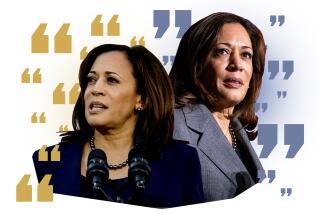For Bush and Gore, the Truth Comes in a Variety of Shades
- Share via
Has George W. Bush’s Texas been soft on hate crimes? Has it let its children go without health care? Has it let the quality of its air and water deteriorate?
The answer to all three questions, debated vigorously Wednesday by Gov. Bush and Vice President Al Gore, is yes, no and sort of.
Compared to their first debate last week, Bush, the Republican candidate, and Gore, his Democratic rival, lobbed few numbers and statistics at each other’s policy positions. That strategy had brought criticism down on both candidates when it turned out that some of the statistics were wrong and the facts less than factual.
In Wednesday’s rematch, by contrast, the candidates resorted to more subtle weapons, carefully emphasizing certain points, omitting others and generally trying to shade the truth in their favor.
Occasionally they shaded too far, not so much in condemning their opponent’s position but in defending their own.
Bush, for example, seemed to imply that Texas’ tough hate-crime prosecution had brought the death penalty to the three whites convicted of dragging James Byrd Jr., a black, to his death in 1998. In fact, the three were convicted under Texas’ capital murder statute and only two of the three were sentenced to death. The state has a hate crime statute, but it is vague.
Bush Was Equivocal Earlier on Yugoslavia
Addressing foreign policy, Bush asserted that he had always supported last year’s NATO bombing campaign against Yugoslavia. That is an easy position to take now, the week after Yugoslav President Slobodan Milosevic left office in part as a result of the military campaign.
But in the bombing campaign’s early days last year, Bush was actually much more equivocal. He said, “The ultimate question is: Will this military action lead to the goal of ending the conflict and bringing peace and stability to the region? I fervently hope so, although I share the concerns and misgivings of many Texans and Americans.”
Gore fell into the same trap at least once. During a debate on environmental issues, the vice president said of Bush, “He’s right that I’m not in favor of energy taxes.”
Maybe he wasn’t Wednesday. But he supported a BTU tax early in his first term as vice president, and he proposed a tax on carbon burning in his 1992 book, “Earth in the Balance.”
Bush seemed disingenuous in describing his role in combating air pollution in Texas, where some large cities have severe smog problems. For most of his governorship, Bush left unchanged the law that allowed about 1,000 utility plants and other industrial plants built before the federal 1971 Clean Air Act to meet lower emission standards than newer plants.
In 1999, as federal regulators were threatening to cut off highway funds to the state unless its major cities met clean air requirements, Bush pushed two air pollution control bills in the Legislature. One bill mandated a reduction in emissions from utility plants, which amounted to about a fifth of the polluting plants. Bush touted that measure in the debate Wednesday.
He did not mention the other bill that covered the larger number of polluting refineries, petrochemical installations and industrial plants. It allowed compliance with the tougher standards on a voluntary basis. It did assess higher fees for companies that continued to pollute. On one of the debate’s most contentious issues, Gore and Bush offered completely different pictures of health care coverage in Texas. Both, in their own way, were accurate.
Both Are Correct on Texas Health Coverage
Gore is right, according to the U.S. Census Bureau, that Texas ranked 49th among the states in the share of people without health insurance--23% lacked insurance in 1999.
Bush, however, was correct in saying that Texas has signed up low-income children for the state Children’s Health Insurance Program as rapidly as possible since the program’s approval in 1999. In the first five months of the program, the state signed up children more rapidly than either California or Florida.
Bush did not push for the most extensive coverage when the legislation was being drafted to cover kids. He proposed covering only children in families with incomes up to 150% of the poverty level. Ultimately, however, he agreed to a proposal by Democrats in the state Legislature to cover children in families with incomes up to twice the poverty level, making an additional 220,000 children eligible.
Texas was also the focus of the candidates’ clash on hate crime legislation. Byrd’s horrific murder led many Texans to call for strengthening the state’s hate crime law. Gore charged that a tougher Texas measure failed at least in part because of Bush’s failure to support it, a charge that Bush did not directly answer.
Democrats proposed the bill, which was supported by Byrd’s family, in 1999. At the time, Democrats charged that Republicans bottled it up in committee to spare Bush the problem of having to decide whether to sign it. The measure was controversial with conservatives because it extended protections to gays and lesbians.
When asked whether he supports the measure, Bush responded, “I will look at the bill when it makes it to my desk, if it makes it to my desk.”
(BEGIN TEXT OF INFOBOX / INFOGRAPHIC)
Foreign Intervention
The candidates were asked about major U.S. military interventions over the last 20 years and in which cases, as president, they would have supported it. A rundown of their answers:
*--*
Bush Gore Lebanon Yes No Grenada Yes Yes Panama Yes Yes Persian Gulf Yes Yes Somalia No* No* Bosnia Yes Yes Haiti No Yes Kosovo Yes Yes
*--*
*Both said they supported intervention initially but later changed their mind.
More to Read
Get the L.A. Times Politics newsletter
Deeply reported insights into legislation, politics and policy from Sacramento, Washington and beyond. In your inbox twice per week.
You may occasionally receive promotional content from the Los Angeles Times.










